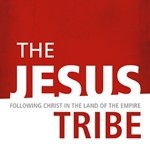 My hat is off to Tiffany Orr for this great article and interview. Thanks Tiffany for the love!
My hat is off to Tiffany Orr for this great article and interview. Thanks Tiffany for the love!
Jesus. America. Apple pie. Guns. Whoever the Republican candidate is at the moment. Based on the prevailing stereotype of the prototypical American Christian, it seems as if you don’t love all of the above, you haven’t any hope of getting into heaven. But shouldn’t American Christians be above that? Isn’t the call of Christ and living the Christian life above the caricatures we’ve become?
Ronnie McBrayer seems to think so. McBrayer is a syndicated columnist who has been a pastor, chaplain and social justice ministry leader. His latest release, The Jesus Tribe: Following Christ in the Land of the Empire, goes to the Source and uses Jesus’ Sermon on the Mount as a springboard to discuss what it seems to mean to be a Christian in America and what it should actually mean.
Recently, I got a chance to sit down with McBrayer to discuss The Jesus Tribe.
TO: What’s this book about in a nutshell?
RM: In short, this is a book about Jesus’ Sermon on the Mount and what it means for followers of Jesus to live it today. To follow Jesus is not just to walk over the horizon of death into the sweet by and by; it is to become like him, to take his ways and words to heart, and to live by them. Living this way will put a group of people in the position of graciously resisting how things “really work,” and it will give them the opportunity to live alternatively in the world.
TO: What inspired you to write this book?
RM: I was working on a previous writing project when the idea that becameThe Jesus Tribe was first conceived. I was writing about how Jesus offers his followers an alternative way to live in the land of the Empire – we don’t fight it with violence, we don’t go along with it or become like it – we defy it by living differently. About that same time I was doing some personal reading of the Sermon on the Mount, Jesus’ own blueprint for his disciples lives, and I was doing some genealogy study of my family’s Cherokee ancestors. This all fused together over several months and the book became to emerge.
TO: What’s the Jesus Tribe?
RM: The Jesus Tribe is a metaphor for the church. Seth Godin defined a tribe as a group of people connected to one another, connected to an idea, and connected to a leader. For the church, Jesus is our leader, the Kingdom of God is the idea, and those of us who have heard and heeded the words “Follow me” form the people connected one to another. This is The Jesus Tribe.
TO: From the synopsis, it seems like you are saying that the United States isn’t God’s Kingdom on earth. That’s a pretty bold statement. Are you worried that people will say that you aren’t patriotic because of that?
RM: First, yes, I am emphatically saying that the United States is not the Kingdom of God. Like a growing number of Christians in North America I have developed this aversion to attaching a national flag – any national flag – to the cross or the way of Jesus. God’s Kingdom cannot be taken hostage like that, for the church’s identity cannot be bound to any earthly nation. The church is a unique, called-out people who live as aliens and strangers in a world that is no longer our home.
Second, I know some people will think me very un-American to say such things. I love America, sing the national anthem, and say the pledge; but as a follower of Jesus I must pledge my primary allegiance to him, even if this is perceived as a lack of patriotism.
TO: But wait, most Americans are purportedly Christian. Isn’t that a sign that this is Christendom? What’s wrong with that thinking?
RM: I think the majority of Americans perceive themselves as “American Christians” rather than being Christians who happen live in America. The majority of this country’s churches are fiercely joined to American goals, ambitions, ideals, and nationalism and they let that nationalism steer their social and theological agenda more than the way of Jesus.
And undeniably, yes, it is an American version of Christendom, a fusion of the Christian faith with the powers that be. Nothing, in my opinion, robs the church of its witness like this union with power. For all of us living in North America, the connection between the church and power is basically all we have ever known. It’s what most of Europe has known. Not many decades after Christianity began somebody decided it would be a good idea to join forces with the powers systems.
After all, imagine how many people could be converted, helped, enrolled, and evangelized if the church were more powerful, more organized, and more efficient. The church went for power and won it in spades. The coffers ran over with gold; people of influence, including the emperor, began to seek the ministers’ approval on public policy; the pews were full every Sunday; and there were no more martyrdoms – unless you were someone who opposed this new arrangement. But what actually happened was the Empire gained everything by becoming “Christian” (but didn’t really have to change anything), and the church lost everything by picking up the means and ways of the world.
Sure, things got bigger, but not better, because the church gave away its identity.
TO: In a nutshell, how then should American Christians live?
RM: I think the Sermon on the Mount is the best blueprint we have, not in some legalistic, Ten Commandment kind of pattern, but as the overall trajectory for the disciple’s life. Ben Witherington calls the Sermon on the Mouth “Jesus’ Greatest Hits,” as a summary of what it means to be his disciple. These words serve as a means, maybe the most practical means, of actually following Jesus.
This does not mean that Jesus’ words from the Sermon on the Mount will answer all our questions about what it means to follow him. These words will not defuse the tension or untangle the knot of clinging to Christ while living in a violent, hateful, power-hungry world. These words may in fact produce even more angst for us than if we had just left them alone. But for those of us who have grappled with what it means to pursue Jesus in these uncertain chaotic times, I hope this book will begin to flesh out some of these implications, possibilities, and complexities.
TO: What do you want people who read it to take away from it?
RM: I just want them to have an open heart and think in a direction they have never considered before. An early reader of the book wrote to me after a couple of chapters and asked, “What in the world are you talking about?” He wrote me again a few days later and said, “I’m halfway through the book now. I’m beginning to get a grip on what you are saying. For me, never has such a small book contained such a big idea.”
That reader and I will likely never agree on all the points in this book. I’m okay with that! He has an open mind and with that openness there is opportunity for us to dialogue and grow together. What else could any author ask for?
TO: What is the most challenging portion of this book?
RM: By far, the section of the book that focuses on Jesus’ words about non-retaliation, non-violence, and love for enemies is the hardest to swallow – for readers and the author! As I write and speak on a wide variety of topics, this one subject – Jesus’ way of nonviolence – always generates the most controversy, and blisteringly so.
Why is this? It is because we believe that violence can somehow save us; we believe that killing will prevent future killing; simply trust the way of the gun more than we trust the words and way of Jesus. Even as I say this, I can feel myself colliding with the dominant values around me, with my parishioners, friends, and family. My internal conflict is heightened as I can make no guarantees that I would “turn the other cheek” if violence was brought against my person or family; I might respond with killing vengeance.
But we must realize that either 1) Jesus did not mean what he said, 2) He did not say what he meant, or 3) He actually said what he meant and meant what he said. The third option seems to be the correct one, though I really don’t like that very much. I would rather take vengeance against those who harm me, but that is not the way of Christ.
TO: Who should buy this book?
RM: Those who are suspicious of the dominate models used by the church to engage the world will find a lot to think about here. Those who are looking for an authentic Christian witness in a Post-Christendom world should certainly consider picking up a copy. I’d like to say that everyone will enjoy this book, but that won’t be the case.
Those who want to “take America back” by force or by violence won’t find much traction for such thinking in The Jesus Tribe. And those who seem to enjoy the culture wars seething in so many strands of Christianity, should probably leave this book on the shelf.
TO: Where can people get this book?
RM: Amazon and Barnes and Noble carry the book in print and electronic forms, and it will be available at Apple as well. One can visit my website, www.ronniemcbrayer.net, as well.

